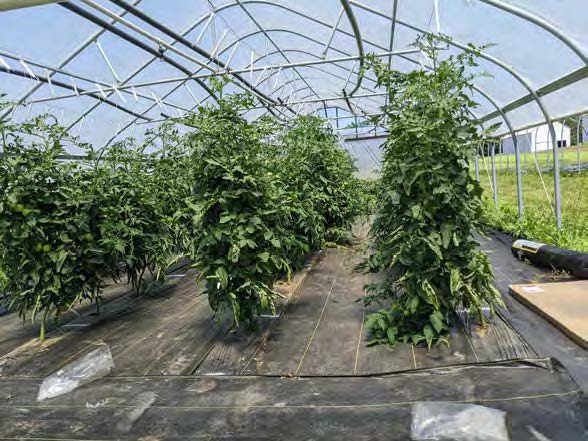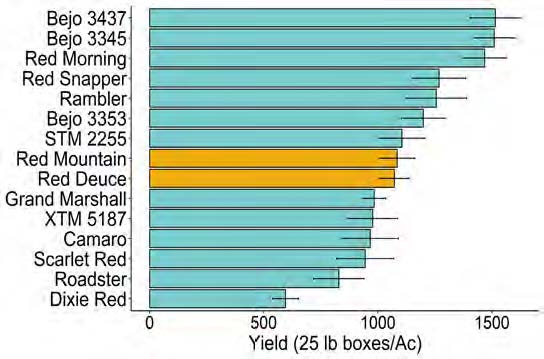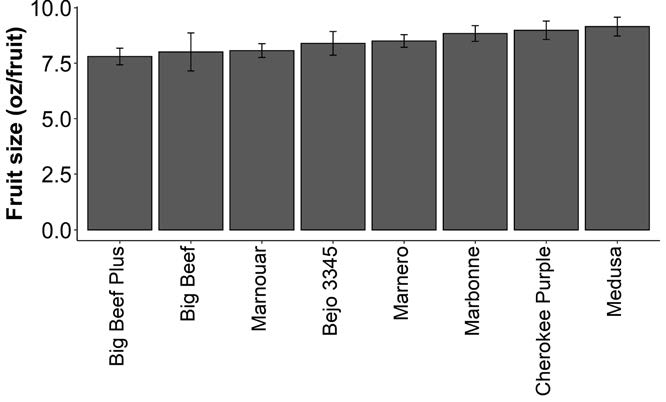Evaluation of New Artisan Type Tomato Cultivars in Southern Maryland, Year 2

Alan Leslie, Center Director WMREC, CMREC, LESREC
Growing heirloom tomatoes is an attractive option for local markets, because they offer superior flavor characteristics and typically produce fruit that are large with unique colors and
shapes. In farmers markets, roadside stands, and CSAs, consumers will pay premium prices for good quality heirloom-type tomatoes. By definition, heirloom tomatoes are older varieties that are open pollinated and have indeterminate growth. Although these varieties have excellent flavor and texture, they often lack other characteristics of commercial tomato varieties, such as a high, concentrated yield, and disease resistance. Recently, hybrid varieties have been developed that produce fruit similar to heirloom varieties, but with hybrid genetics that impart improved yield and disease resistance. In 2022, we conducted a second year of a variety trial testing some of these newer hybrid heirloom-type tomatoes against a commonly grown true heirloom.
The 2022 trial included six different varieties. Cherokee Purple was used as the true heirloom variety for comparison purposes. Cherokee Purple is widely grown in Maryland, has deep red to black colors with distinctive green shoulders, and has no advertised disease resistance. The remaining five varieties were all hybrids. Big Beef Plus is an improved version of an older hybrid beefsteak variety that maintains excellent flavor characteristics while improving disease resistance. The newer hybrid varieties tested were Marbonne, Marnero, Marnouar, and Medusa. Marbonne is a variety that produces large fruit that are bright red and deeply ribbed. Marnero, Marnouar, and Medusa all produce large fruit that are similar in appearance to Cherokee Purple. Marbonne and Marnero require long days, with at least 13 h of daylight, to produce fruit, while Marnouar and Medusa produce fruit with shorter day lengths. Seed for Cherokee Purple and Big Beef Plus generally cost less than $0.10/seed, while the newer varieties cost between $0.50 – $1.60/seed.

Separate trials were planted at CMREC-Upper Marlboro and at the St. Mary’s County Extension Office. At each site, plants were grown in high tunnels, with four (CMREC) or three (St. Mary’s) replicates, as rows. Transplants were placed in the ground April 24 at CMREC and April 18 at St. Mary’s. Plants were trellised using a single leader at St. Mary’s and a double leader at CMREC. All suckers were removed on a regular basis, and all leaves were pruned from the base of the vines following harvest of the first few tomato clusters. Tomato fruit were harvested when fully ripe, and all fruit were counted, graded by size, and weighed over five harvests at CMREC and seven harvests at St. Mary’s.
All varieties grew well, and put on vigorous vegetative growth early in the season. In terms of total yield, there were not great differences in the performance of different varieties. At CMREC, Big Beef Plus (16.5 lbs/plant) had significantly higher yield than Cherokee Purple (11.2 lbs/plant), and all other varieties were intermediate in yield (12.6 – 15.0 lbs/plant). At St. Mary’s, Marbonne (9.7 lbs/plant) had significantly higher yield than Big Beef Plus (6.1 lbs/plant), and all other varieties were intermediate in yield (7.4 – 8.2 lbs/plant). There were not statistically significant differences in the average fruit size for the different varieties, and the average size ranged from 7.8 oz for Big Beef Plus to 9.2 oz for Medusa.
Overall, we did not see a significant benefit of planting any of these newer improved hybrid varieties over the conventional heirloom Cherokee Purple or the older hybrid Big Beef Plus. All of the varieties had issues with cracking and splitting, which are common for larger, soft-skinned tomato varieties. Neither site had any history of tomato disease pressure, which may have resulted in better performance of the newer hybrids with enhanced disease resistance. However, the high price of seed for the new improved hybrids did not result in higher yields or better-quality fruit

in this trial. In cases where there is known disease pressure, grafting resistant rootstocks onto the traditional heirloom cultivars may provide a more economical solution, and may also result in improved yields.